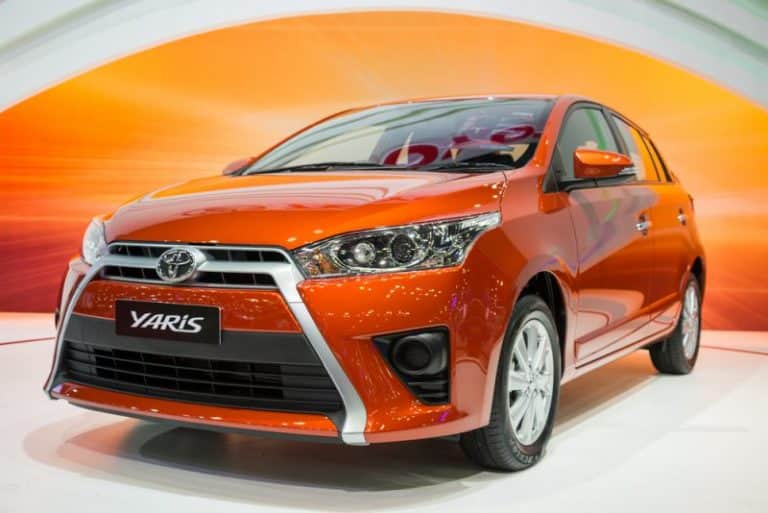Can Toyota Yaris Use E10 Fuel? (Explained)
For the sake of maintaining your fantastic car, it is better you know the right thing to do and do it as well.
The damages that an E10 will cause to your vehicle if the two aren’t compatible may be pretty devastating.
Different models of Toyota cars engines run on other fuels, and not all car models are consistent with the E10 kind of fuel.
Does the Toyota Yaris use the E10, or does it run on the 91?
The Toyota Yaris is a car with a fantastic engine design that allows it to run on both E10 and the 91. In addition, the Toyota Yaris has a turbo engine that can tolerate a higher octane rating other than the recommended 91, which is the E10. Therefore your Toyota Yaris can run on the E10 fuel without any damage.
Can You Use E10 in Toyota Yaris?

Car engines will tolerate a higher than required octane rating, but a lower than the minimum necessary will damage that car’s engine.
Therefore, the engine of the Toyota Yaris is quite capable of running on the E10 fuel. At the same time Toyota Hibrid, Alphard & Pirus are compaitable wiht E10 fuel.
The simplest and most efficient way to know if your Toyota Yaris engine can run on the E10 fuel is to check the car’s manual.
You should find either E5 or E10 written inside it under its fuel recommendation. Always avoid assumptions and do well to check the manuals to be sure.
However, the very old Toyota models of the 90s may not use this fuel type. The E10 is quite a delicate type of fuel because of its ethanol content and sometimes tends to be destructive to other cars.
Only a few cars are good to run on it, and the Toyota Yaris falls under that list. Also, if your car entered the market around 2011, it should work with the E10.
Therefore, it is safe to say that the E10 is a 21st-century fuel.
What Fuel Does a Toyota Yaris Use?
The design of this Toyota Yaris is entirely excellent, so much so that it can even run on a few numbers of fuel.
The Toyota Yaris model comes along with two sets of modeled petrol engines which allows it to run on both the E10 and 91.
Some speculations hold that it can run on a higher octane number like the 95 since it is only slightly higher than the E10. However, not all cars work in this manner; the Toyota Yaris is peculiar.
Toyota Yaris has a petrol engine and a hybrid powertrain, making it compatible with the E10 fuel.
The design of its liter turbo engine makes it capable of withstanding all the complications that can come with the E10 fuel.
The Toyota Yaris falls under the modern cars of today that are compatible and can run on the E10 fuel. No wonder they are classic in design and sound in emission.
Amazingly they are also designed to run on the 91 as fuel. So using the 91 to run your Yaris doesn’t cause any damage per se to the vehicle.
However, there is a decrease in performance operating below its capacity. I believe that the designers meant for it to run on 91 in that most cars still function with the 91, and they can be readily available.
But take note that fuel with a lower octane rating than this will knock the car’s engine.
Is E10 Fuel Good For Your Car?
The new E10 fuel is not compatible with most cars yet due to its nature. In addition, the high biogas content may cause corrosion in older cars’ gaskets, metals, and plastics.
Therefore you ought to be sure that your car can run on E10 before you fuel it, or else the complications will cost your vehicle.
However, the latest model of cars as from 2011 are compatible with the E10 fuel. Therefore, for the newer car models, E10 is most suitable since it burns quicker than standard petrol.
The E10 fuel is the latest development in reducing harmful emissions from vehicles on the road as they move.
This fuel is not only good for cars but the environment as well, as it tends to reduce the overall emission level of carbon dioxide in the atmosphere.
So the E10 fuel, in a way, is a method of reducing the greenhouse effect, which in turn increases the overall cleanliness of cars on the road.
Many vehicle petrol engines do not use the E10, but with time, the E10 will become standard for vehicle use and most probably the E85.
So do not be too quick to use the fuel in your car if it doesn’t support it, as every good thing also has a bad side.
Only expert cars with an excellent turbo injection engine use this fuel, unsuitable for ordinary injection petrol engines.
Is E10 Better Than 91?
The difference between the two types of fuel, E10 and 91, is simply the octane rating number. That’s like the chemical standard and efficiency of the fuel.
The E10 is slightly above the 91 in octane rating but less than 95. The E10 is also a very clean fuel that you can reproduce with less effort, and it has a significant role to play in the economy in years to come.
Therefore, you can consider the E10 a better fuel to the 91.
E10 type of fuel is practically a combination of the regular petrol with biogas in a particular proportion.
The use of biogas makes it less expensive and more efficient than other types of fuels like the 91. Plus, bio-gas (ethanol) can be easily gotten from nature.
So, unlike 91, which is unrenewable, E10 also brings back revenue to the economy.
This goes a long way in affecting the economy positively as it is a renewable source of energy.
The E10 is a mixture of 10% ethanol with 90% regular petrol. This combination raises the octane rate slightly above 94, making it a far better goal than 91.
Although the E10 burns faster than standard injection petrol, it is less expensive since ethanol is a renewable resource.
As much as most cars are compatible with the 91 fuel, modern-day modern cars demand better fuel.
Come to think of it, the air we breathe is constantly being polluted with the by-products of the combustion from cars.
It is only reasonable that we sort out a way of reducing this harmful product in the atmosphere by introducing another fuel source.
The E10 and probably the E85 will go a long way in reducing the emission of those toxic substances in the atmosphere.
Conclusion
The fuel quality to be used in any car is just as important as the car itself. The wrong fuel type for a vehicle can cause severe damage to the vehicle engine, even as much as knocking the vehicle’s engine.
However, the latest E10 fuel is manufactured to be compatible with our present-day kind of cars.
The E10 is an ideal fuel type since it aids faster combustion in vehicles and reduces carbon dioxide levels in the atmosphere.






